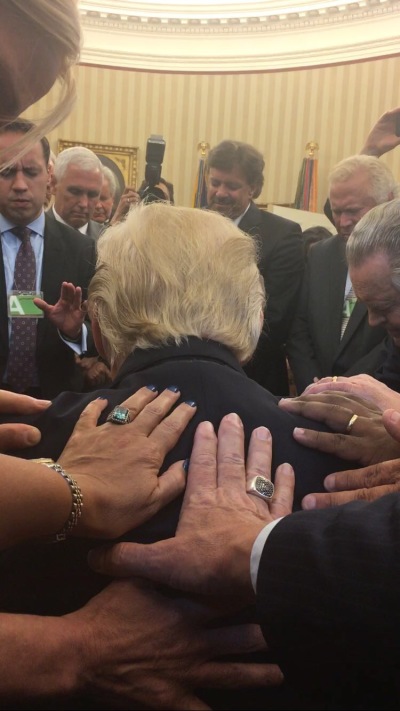Evangelical Leaders Praying for Trump 'Bordering on Heresy,' Liberal Pastor Says

According to liberal Christian civil rights leader Rev. William Barber II, evangelical leaders who gathered at the White House to pray over President Donald Trump last week have violated "the sacred principles of religion" and have committed "theological malpractice."
Barber, who is the head NAACP chapter in North Carolina and pastors the Disciples of Christ congregation Greenleaf Christian Church in Goldsboro, appeared as a guest on MSNBC Saturday and commented on the widely publicized photo shared by Trump evangelical advisor Johnnie Moore on Twitter. The photo showed evangelical leaders laying hands on Trump as they prayed over him in the Oval Office.
Host Joy Reid specifically asked Barber what he thought of the "laying on of hands and this embrace of Donald Trump by the evangelical right, of the Christian right."
"[I]t is a form of theological malpractice that borders on heresy," Barber answered. "When you can p-r-a-y for a president and others while they are p-r-e-y, preying on the most vulnerable, you're violating the sacred principles of religion."
Barber then quoted from the Old Testament to argue that the evangelical right is guilty of a "moral hypocrisy."
"You know, there is a text in Amos Chapter 2 that says religious and moral hypocrisy looks like when a nation of political leaders will buy and sell upstanding people when they will do anything to make money, when they will sell the poor for a pair of shoes, when they will grind the penniless into the dirt and shove the luckless into the ditch and extort from the poor," Barber said. "That is an actual text. There is a text that says when you do not care for the sick, you are actually violating the principles of God."
Barber continued by arguing that "we have this extremist Trump-Republican agenda" that wants to strip over 20 million Americans of health insurance by repealing the Affordable Care Act and "transfer wealth to the greedy."
"That's hypocrisy and sin," Barber, who has led numerous civil rights protests in the past, continued. "Seven hundred billion dollars, Joy? You haven't seen that kind of transfer of wealth on the backs of bodies of people since slavery."
"Claiming to care about life, but then passing a bill when you know thousands will die — 22 million people, poor, working people will be hurt — that is hypocrisy and sin," Barber added. "When you know it will hurt children, the disabled and veterans, that is sin. That is hypocrisy."
Barber asserted that the evangelical leaders should instead be "challenging" Trump and Congressional leaders and "not trying to appease them."
"Instead, they are acting like priests of the empire, rather than prophets of God," Barber stated.
Dr. Michael Brown, a conservative radio host and founder of Fire School of Ministry, is curious as to why Barber believes praying for the president is a theological misstep.
"I appreciate Rev. Barber's heart for social justice. And while I share his antipathy for religious hypocrisy, his criticism is completely off base, if not hypocritical itself," Brown wrote in a recent op-ed published by The Stream, adding that Christians should always pray for their leaders.
Brown cited 1 Timothy 2:1-4.
"First, we are called to pray for our leaders, be they good or bad," Brown wrote. "As Paul instructed Timothy, 'I urge that supplications, prayers, intercessions, and thanksgivings be made for all people, for kings and all who are in high positions, that we may lead a peaceful and quiet life, godly and dignified in every way. This is good, and it is pleasing in the sight of God our Savior, who desires all people to be saved and to come to the knowledge of the truth.'"
Leading evangelist Franklin Graham, the president of the Billy Graham Evangelistic Association, issued similar thoughts in 2014 when President Barack Obama was in office.
"We know from Scripture that God can turn the hearts of kings (Proverbs 21:1). That means that we should be praying for God's will to be done and for our leaders to seek God and listen to Him," Graham wrote in a piece published by BGEA. "We should pray that they would be surrounded by godly counsel and, most important, that our leadership would personally know God and the salvation found through faith in Jesus Christ alone."
Moore, who serves on Trump's evangelical advisory board, explained in a statement that many evangelicals feel it is their "sacred responsibility to pray for the president."
"[T]his is very much in our tradition as Americans who once took — and sometimes still do take — this responsibility seriously," Moore stated.
Michael Wear, who directed faith outreach for Obama's 2012 reelection campaign and is an evangelical Democrat, pointed out in a tweet last Wednesday that religious leaders also prayed over and laid hands on Obama.
"Some criticized these clergy for this photo (which they didn't take, by the way), and I disagreed with those misguided criticisms," Wear wrote in the tweet.
In another tweet, Wear clarified that he doesn't believe it is wrong for clergy to meet with or support politicians.
"Pastors are people/citizens too," he wrote. "And while there's room for disagreement, I don't hold that clergy shld never meet with/support politicians."
Trump's meeting with evangelical leaders came after he participated in a White House dinner with evangelical leaders in May, the day before the National Day of Prayer and the signing of an executive order promoting religious liberty. After the dinner, Trump took the evangelical leaders on a tour of the second floor of the White House.
Trump also heavily courted evangelical leaders during his 2016 presidential campaign and even held a meeting with over 900 evangelical leaders in New York City last June.
Additionally, several evangelical leaders serve on Trump's evangelical advisory board and are in contact with administration officials.





















